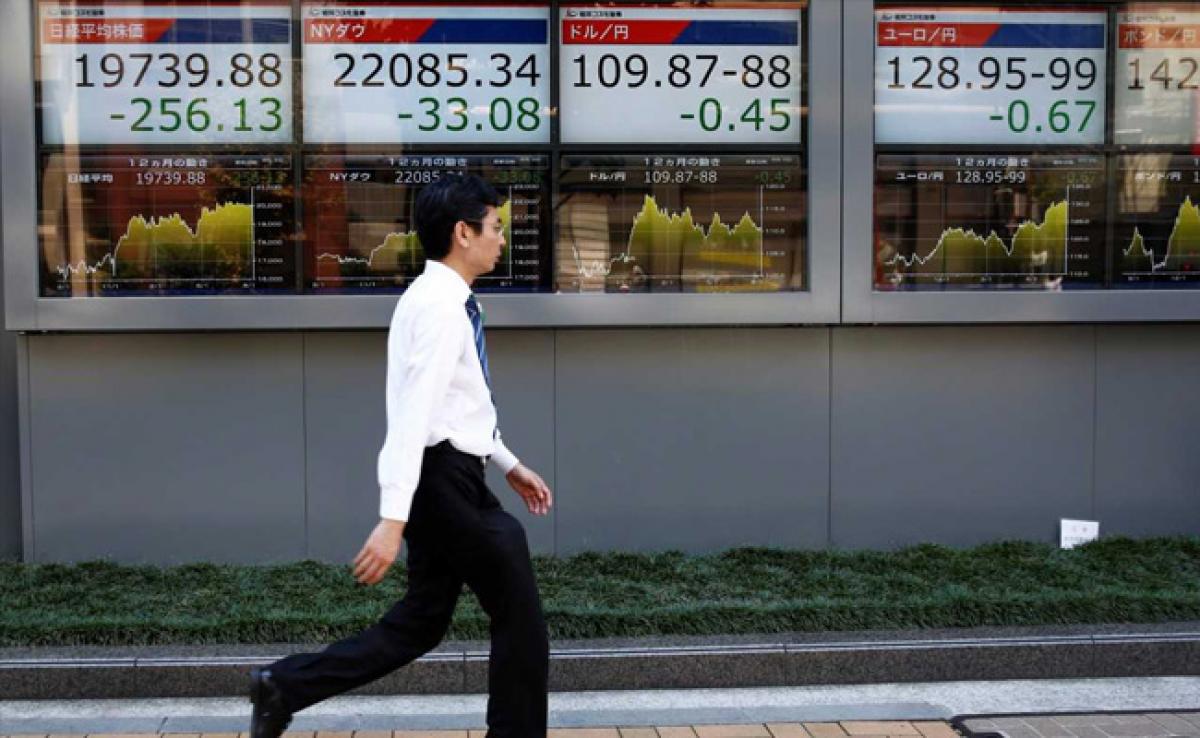Live
- Bihar: Deceased patient's eye missing, RJD condemns incident at Nalanda Medical College
- Rammurthy Naidu's Last Rites Held in Naravari Palli
- PM Modi receives ceremonial welcome in Abuja, begins bilateral talks with Nigerian President Tinubu
- Goods traffic doubles on the new railway freight corridors
- BGT 2024-25: I’d like to see him make one more Test ton in Australia, says Johnso
- Harassment due to ED raids forced Kailash Gehlot to quit, hints Kejriwal
- Kailash Gehlot exit: BJP goes on the offensive against 'corrupt' AAP govt
- PM Modi pays homage to ‘the great’ Balasaheb Thackeray on his death anniversary
- One who cares for Delhi will not stay with gang of robbers: Sachdeva on Gahlot's resignation
- From Self-Doubt to Self-Love: Vange Cain’s Inspirational Path
Just In

Asian shares tried to regain some poise on Friday after a tough week in which the gathering risk of a U.S. rate rise lifted Treasury yields towards nine-year highs and boosted borrowing costs across the region.
Asian shares tried to regain some poise on Friday after a tough week in which the gathering risk of a U.S. rate rise lifted Treasury yields towards nine-year highs and boosted borrowing costs across the region.
Activity seemed mainly confined to book-squaring for the end of the month and quarter, and moves in markets were modest at best.
MSCI's broadest index of Asia-Pacific shares outside Japan inched up 0.1 percent, but was still down a sizable 2.1 percent for the week so far.
Japan's Nikkei was off 0.1 percent, though South Korea managed to recoup 0.4 percent of gains.
Many markets in the region have been cold shouldered this week as investors priced in a greater probability of a rate hike from the Federal Reserve in December.
Fed funds futures imply around a 73 percent chance of a move at the Dec. 12-13 policy meeting.
As a result, yields on two-year Treasuries reached a near nine-year top before pulling back a touch to 1.46 percent on Friday. They had been as low as 1.254 percent early in September.
Adding to the upward pressure was President Donald Trump's proposals for steep tax cuts which, if passed, could benefit U.S. corporations' profit margins.
The plan, however, lacked any detail on how it might be paid for and faced much opposition in Congress.
"As tax negotiations intensify, significant procedural, fiscal and political constraints are likely to become apparent," cautioned Richard Franulovich, an analyst at Westpac, while noting the economic benefits of the plan were also in doubt.
"The size of the tax cut is simply too large to be realistic and repealing deductions will prove politically difficult."
Still, a tax cut that made U.S. equities more attractive while lifting the dollar and Treasury yields would likely prove negative for emerging markets, particularly those that relied heavily on foreign investment.
The risk alone was enough to rattle share, bond and currency markets in Asia on Thursday, and they will remain vulnerable to headlines on the tax package as it moves through Congress.
DOLLAR REPRIEVE
The jump in Treasury yields proved a much-needed tonic for the U.S. dollar. Against a basket of currencies the dollar index was up 0.12 percent on Friday at 93.197, to hold gains of 1.1 percent this week.
The euro held at $1.1778, having bounced from a six-week trough of $1.1715, but was still down 1.5 percent for the week so far. If it remains there, that would be the largest weekly loss since November 2016.
The dollar was also on track for its third week of gains on the Japanese yen at 112.55, though it failed to sustain a peak of 113.26.
Over on Wall Street, the Dow had ended Thursday with a minor gain of 0.18 percent, while the S&P 500 added 0.12 percent and the Nasdaq was flat.
All three were at or near record highs, stirring concerns about rich valuations. The forward price-to-earnings ratio (P/E) on the S&P stood at 17.9 compared with its long-term average of 15.1, while the forward P/E on the Russell is 26.3 against an average of 21.3.
Important data on inflation from the European Union and the United States are due later in the session, along with economic growth figures in Canada.
Early readings on Chinese manufacturing are out on Saturday ahead of a week-long holiday in the Asian giant.
The EU also faces more political uncertainty on Sunday when Catalan separatists are set to defy Spanish efforts to block an independence referendum.
In commodity markets, oil prices were trading modestly firmer in early Asia having touched two-year peaks early in the week.
Brent was 19 cents higher at $57.60 a barrel, while U.S. crude rose 3 cents to $51.59 a barrel.

© 2024 Hyderabad Media House Limited/The Hans India. All rights reserved. Powered by hocalwire.com







